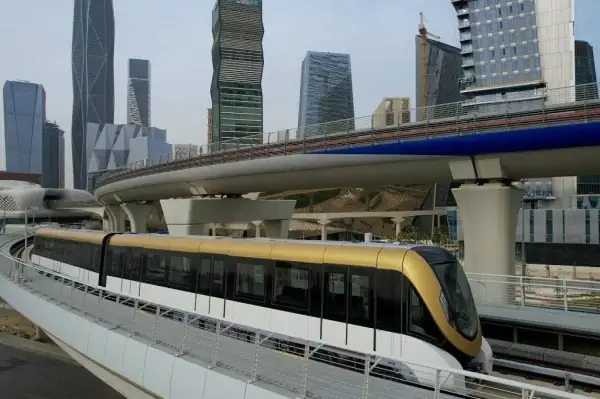RIYADH — Saudi Arabia’s capital is poised to witness a transformative moment in its urban development with the partial launch of the Riyadh Metro on Wednesday, November 27.
The first phase of this ambitious project will commence operations on three key lines, with the remaining three set to open in mid-December, as reported by Al Eqtisadiah.
Designed to be the world’s longest driverless metro system, the Riyadh Metro is central to the Kingdom’s vision of reducing vehicular dependence and supporting Riyadh’s growth into a global trade and business hub.
The project is a critical component of Saudi Arabia’s economic diversification plans under Vision 2030, emphasizing sustainable urban infrastructure.
Phase One to Cover Strategic Routes
The initial launch will see metro services fully operational on three lines, covering vital areas: Al-Orouba to Batha, King Khalid International Airport Road, and the intersection of Abdulrahman Bin Auf Street with Sheikh Hassan Bin Hussein Street.
By mid-December, the remaining lines along King Abdullah Road, Al-Madina, and King Abdulaziz Road will bolster the network, significantly enhancing connectivity across Riyadh.
The Riyadh Metro is expected to revolutionize public transportation in the capital, offering an efficient and eco-friendly alternative to private vehicles.
Authorities aim to attract a broad range of passengers with competitive ticket pricing and discounted travel packages, details of which are anticipated to be announced soon.
A Green Revolution in Public Transit
One of the standout features of the Riyadh Metro is its commitment to sustainability. Solar panels installed at various stations and depots are designed to generate 20% of the energy required for critical electrical systems. In addition, the trains will incorporate regenerative braking technology to reduce overall energy consumption.
When fully operational, all six lines of the metro will run entirely on renewable energy sources, aligning with Saudi Arabia’s broader environmental goals.
This eco-conscious approach aims to position the Riyadh Metro as not just a transportation solution but a model of sustainable urban development.
A Decade in the Making
The Riyadh Metro project, with a staggering investment of $22.5 billion (SR84.4 billion), was initially approved by the Saudi Council of Ministers in 2012.
Contracts for its construction were awarded to three international consortiums in 2013, marking the beginning of a massive urban transformation effort.
However, the project faced delays, including those caused by the COVID-19 pandemic, which slowed global supply chains and workforce mobilization.
Despite these challenges, the metro’s development reflects Saudi Arabia’s commitment to enhancing infrastructure to meet the demands of a growing urban population.
With the metro nearing completion, the project stands as a testament to perseverance and innovation.
A Vision for the Future
The Riyadh Metro represents more than just a transportation upgrade—it symbolizes the Kingdom’s aspirations for a modern, sustainable future.
By providing an efficient, eco-friendly alternative to traditional modes of travel, the metro will play a pivotal role in Riyadh’s transformation into a world-class city.
As the first passengers board the metro on November 27, Riyadh will mark the beginning of a new chapter in its journey toward becoming a global urban hub.
This article was created using automation technology and was thoroughly edited and fact-checked by one of our editorial staff members

